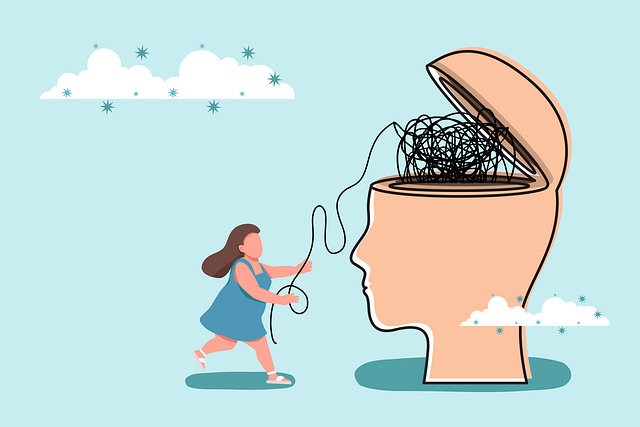Golden Panic Disorder (GPD) and anxiety attacks significantly impact individuals' lives, with GPD characterized by sudden intense panic episodes. Effective therapy for GPD and related anxiety disorders involves Mind Over Matter techniques, empathy building, and Healthcare Provider Cultural Competency Training. Stress management techniques, particularly cognitive-behavioral therapy (CBT), are crucial in treating GAD and GPD. Mindfulness meditation has proven effective in managing stress and treating GPD by reducing anxiety and regulating emotions. Creating personalized stress management plans tailored to unique responses to stress helps individuals avoid escalation of feelings related to GPD and anxiety attacks, fostering mental wellness through lifelong tools.
Stress management techniques are essential in navigating life’s challenges, especially for those dealing with disorders like Golden Panic Disorder and Anxiety Attacks. This comprehensive guide explores effective strategies to combat stress-related disorders. From understanding the fundamentals of these conditions to delving into specific therapies like Cognitive Behavioral Therapy (CBT) and mindfulness practices, we offer practical steps for a personalized approach to managing stress. Discover how therapy plays a pivotal role in treating Golden Panic Disorder and Anxiety Attacks, providing tools for long-term wellness.
- Understanding Golden Panic Disorder and Anxiety Attacks
- The Role of Therapy in Managing Stress-Related Disorders
- Cognitive Behavioral Therapy (CBT): A Step-by-Step Guide
- Mindfulness Techniques for Calmness and Focus
- Creating a Personalized Stress Management Plan
Understanding Golden Panic Disorder and Anxiety Attacks

Anxiety attacks and Golden Panic Disorder (GPD) are common mental health challenges that significantly impact an individual’s quality of life. GPD is characterized by sudden, intense panic episodes that include physical symptoms such as rapid heartbeat, sweating, and shortness of breath. These attacks can be debilitating, causing fear and distressing memories. Therapy plays a crucial role in managing both anxiety disorders, focusing on various strategies to help individuals gain control and reduce their symptoms.
One effective approach is employing Mind Over Matter principles, where individuals learn to challenge negative thoughts and replace them with rational ones. Empathy building strategies are also vital; understanding and recognizing the triggers helps one develop a sense of agency. Additionally, Healthcare Provider Cultural Competency Training ensures that support is tailored to individual needs, making therapy accessible and effective for all.
The Role of Therapy in Managing Stress-Related Disorders

Stress management techniques often play a pivotal role in treating stress-related disorders like Generalized Anxiety Disorder (GAD) and Panic Disorder. Therapy serves as a powerful tool, offering individuals effective coping skills development to navigate these conditions. Through specialized therapeutic approaches, such as cognitive-behavioral therapy (CBT), clients learn to identify and challenge negative thought patterns contributing to anxiety and panic attacks. This process empowers them to manage symptoms and improve overall emotional well-being.
Emotional regulation is a key focus in Anxiety Attacks Therapy, helping individuals gain better control over their emotions. Therapists guide clients in understanding and expressing their feelings healthily, enhancing their emotional intelligence. By mastering these skills, individuals can reduce the intensity of anxiety responses, fostering a sense of calm and resilience in stressful situations. This holistic approach combines coping strategies with emotional awareness, enabling individuals to lead more balanced and fulfilling lives.
Cognitive Behavioral Therapy (CBT): A Step-by-Step Guide

Mindfulness Techniques for Calmness and Focus

Mindfulness techniques have emerged as a powerful tool in stress management and mental health therapy. One of the most effective practices is mindfulness meditation, which teaches individuals to focus their attention on the present moment, thereby reducing anxiety and enhancing emotional regulation. By cultivating awareness of one’s thoughts and sensations without judgment, people can better navigate feelings of panic and prevent full-blown disorder or attacks.
This approach has gained significant traction in Golden Panic Disorder therapy and crisis intervention guidance. It empowers individuals to recognize early warning signs of stress and distress, enabling them to employ coping strategies before symptoms escalate. Moreover, mindfulness practices integrate seamlessly into risk assessment for mental health professionals, offering a holistic framework for supporting clients in managing their emotional well-being.
Creating a Personalized Stress Management Plan

Creating a personalized stress management plan is an essential step towards navigating life’s challenges with resilience and maintaining mental health awareness. This tailored approach recognizes that everyone experiences stress differently, and what works for one person might not be suitable for another. A comprehensive strategy involves identifying personal triggers, understanding one’s unique response to stress, and incorporating effective techniques such as mindfulness exercises and compassion cultivation practices. By learning to recognize the early signs of stress or even Golden Panic Disorder and Anxiety Attacks Therapy, individuals can intervene before these feelings escalate.
This process entails exploring various strategies like deep breathing techniques, meditation, regular physical activity, and hobbies. It’s not just about finding quick fixes but rather developing a lifelong toolkit for managing stress. Incorporating these practices into daily routines fosters mental wellness and enables individuals to thrive in the face of life’s pressures. The Mental Wellness Podcast Series Production offers valuable insights and support by sharing stories and expertise from professionals dedicated to helping others develop effective stress management plans.
Stress management techniques are invaluable tools for those dealing with disorders like Golden Panic Disorder and Anxiety Attacks. By combining therapy, specifically Cognitive Behavioral Therapy (CBT), with mindfulness practices, individuals can develop personalized plans to navigate stress-inducing situations effectively. This holistic approach not only offers relief from symptoms but also empowers people to take control of their mental well-being, fostering a greater sense of calm and resilience in their daily lives.









